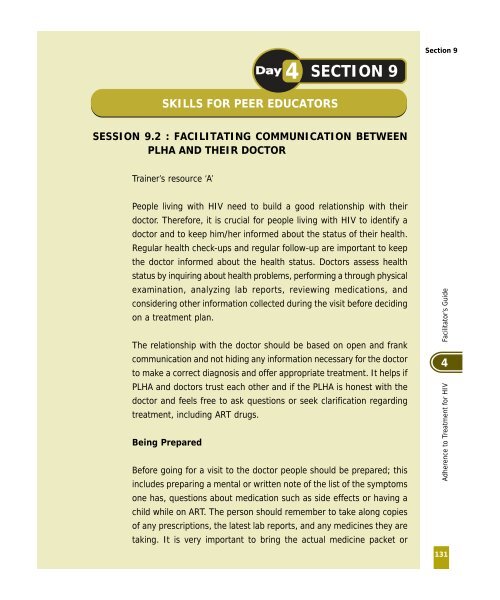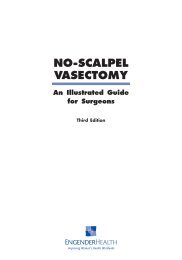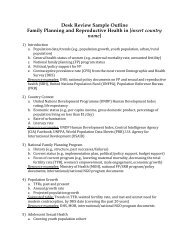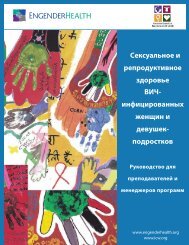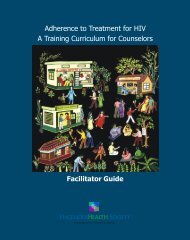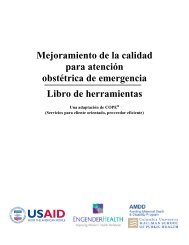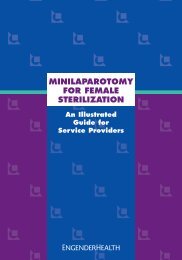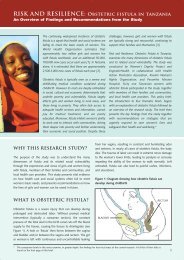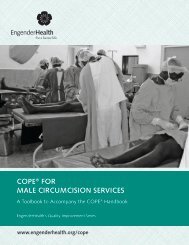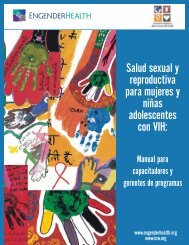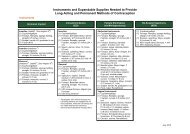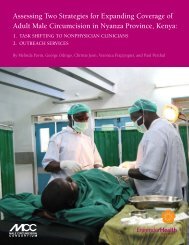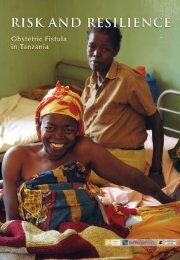- Page 1 and 2:
Adherence to Treatment for HIVA Tra
- Page 3 and 4:
© 2006 EngenderHealth Society.F-6/
- Page 5 and 6:
TABLE OF CONTENTSPREFACEACKNOWLEDGE
- Page 7 and 8:
PREFACEWith funding from the Global
- Page 9 and 10:
ACKNOWLEDGEMENTSWe acknowledge with
- Page 11 and 12:
ABBREVIATIONSARTCD4GFATMIVDUMSMNNRT
- Page 13 and 14:
The Facilitator Guide consists of:
- Page 15 and 16:
How to use the facilitator guideThe
- Page 17 and 18:
This symbol indicatesthe questions
- Page 19 and 20:
8This box should becut and pasteona
- Page 21:
This symbolindicates the triggerque
- Page 24 and 25:
1SECTION 1Section 1INTRODUCTIONS AN
- Page 26 and 27:
1SECTION 1Section 1INTRODUCTIONS AN
- Page 28 and 29:
Section 1Then read out this definit
- Page 30 and 31:
1SECTION 1Section 1INTRODUCTIONS AN
- Page 32 and 33:
Section 1Summarize the results as f
- Page 34 and 35:
Section 22. During the discussion,
- Page 36 and 37:
Section 2Where does HIV come from?N
- Page 38 and 39:
1SECTION 2Section 2HIV AND ANTIRETR
- Page 40 and 41:
Section 210. You cannot contract HI
- Page 42 and 43:
Section 2The list may include the f
- Page 44 and 45:
Section 2• If you do not take you
- Page 46 and 47:
Section 2Steps1. Ask the group if t
- Page 48:
Section 26. Tell the group that to
- Page 52 and 53:
2SECTION 3Section 3RESISTANCE AND A
- Page 54 and 55:
2SECTION 3Section 3RESISTANCE AND A
- Page 56 and 57:
Section 3most appropriate. Creativi
- Page 58 and 59:
Section 34. Provide 15 minutes for
- Page 60 and 61:
Section 3Case Study #2Devi, a perso
- Page 62 and 63:
2SECTION 3Section 3RESISTANCE AND A
- Page 64 and 65:
Section 37. Finish the session by r
- Page 66 and 67:
Section 32. Ask for a volunteer to
- Page 68 and 69:
2SECTION 4Section 4PREVENTION PRACT
- Page 70 and 71:
Section 4Reasons include• Parents
- Page 72:
Section 4Case Study #2Usha, A women
- Page 76 and 77:
3SECTION 4Section 4POSITIVE PREVENT
- Page 78 and 79:
Section 45. After all four role pla
- Page 80 and 81:
Section 4Group ThreeReinfectionYou
- Page 82 and 83:
3SECTION 4Section 4POSITIVE PREVENT
- Page 84 and 85:
Section 4pouch is called the inner
- Page 86 and 87:
Section 4Choose four or five that y
- Page 88 and 89:
3SECTION 4Section 4POSITIVE PREVENT
- Page 90 and 91:
Section 4HIV status. Disclosing one
- Page 92 and 93: Section 53. After, provide the foll
- Page 94 and 95: Section 5Some examples could includ
- Page 96 and 97: Section 57. Tell the group that we
- Page 98 and 99: Section 5and have them draw or writ
- Page 100 and 101: Section 5Characteristics of a Poor
- Page 102 and 103: Section 52. Ask for six volunteers.
- Page 104 and 105: 3SECTION 5Section 5COUNSELING ON AD
- Page 106 and 107: Section 55. Begin a discussion with
- Page 109 and 110: SCHEDULE FOR DAY 4Day Four : Care a
- Page 111 and 112: Section 53. They should write their
- Page 113 and 114: Section 54. Adherence to treatment
- Page 115 and 116: Section 5III.Issues specific to men
- Page 117 and 118: Section 54SECTION 5COUNSELING ON AD
- Page 119 and 120: Section 64SECTION 6CARE AND SUPPORT
- Page 121 and 122: Section 64SECTION 6CARE AND SUPPORT
- Page 123 and 124: Section 6(List these tasks on the f
- Page 125 and 126: Section 73. Assign each group one o
- Page 127 and 128: Section 73. Review Handout 7.2 : He
- Page 129 and 130: Section 82. Participants will now d
- Page 131 and 132: Section 84SECTION 8SERVICES FOR PLH
- Page 133 and 134: Section 84SECTION 8SERVICES FOR PLH
- Page 135 and 136: Section 84SECTION 8SERVICES FOR PLH
- Page 137 and 138: Section 94SECTION 9SKILLS FOR PEER
- Page 139 and 140: Section 97. After all groups are fi
- Page 141: Section 9• A good relationship wi
- Page 145 and 146: Section 94SECTION 9SKILLS FOR PEER
- Page 147 and 148: Section 94SECTION 9SKILLS FOR PEER
- Page 149 and 150: Section 10110CLOSINGSESSION 10.1 :
- Page 151 and 152: Section 104 SECTION 10CLOSINGSESSIO
- Page 153 and 154: Section 104 SECTION 10CLOSINGSESSIO
- Page 155 and 156: Section 10As you go around the circ
- Page 157 and 158: 12. Number of people living with HI
- Page 159 and 160: 13. HIV cannot be transmitted by :
- Page 161 and 162: 150Notes


